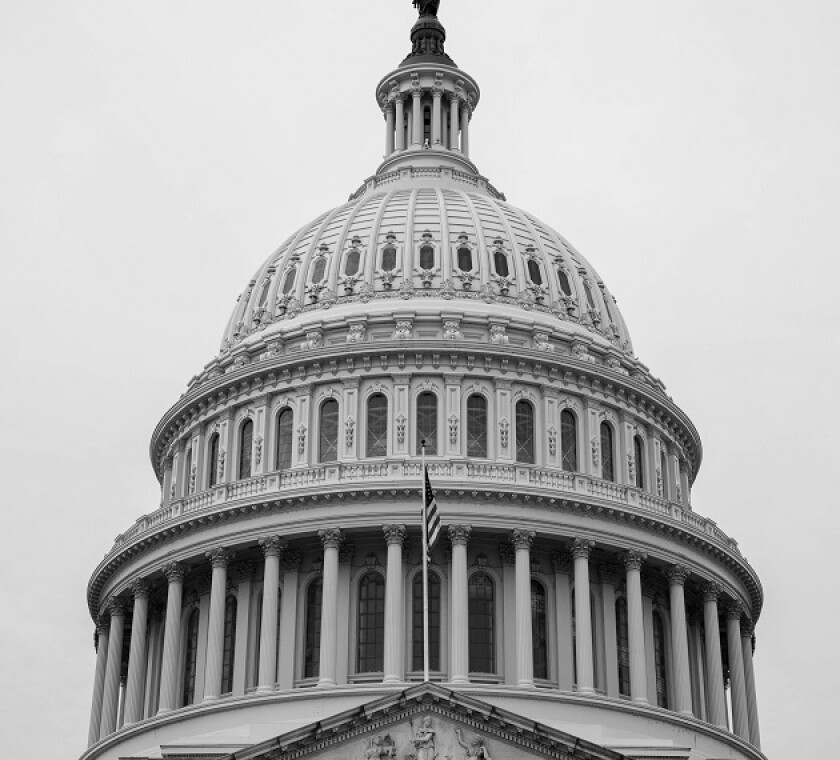As part of plans to restore infrastructure, the US Senate has proposed a provision to enforce tax reporting standards for cryptocurrency transactions of more than $10,000. The Senate is still thrashing out the infrastructure bill, but the final details could be settled on August 7.
The $10,000 threshold would allow the Internal Revenue Service (IRS) to gather data on a wider range of transactions and ensure greater tax compliance.
As things stand, investors must disclose virtual currency activity in their tax return through Form 1099-B, but cryptocurrency brokers are exempt from this. Some cryptocurrency exchanges issue an alternative form, 1099-K, but this differs from Form 1099-B in that it does not include the original purchase price.
This information is crucial for calculating the profit rate and applying capital gains tax (CGT). Therefore, the use of this form denies the IRS the basic information it needs to apply CGT to cryptocurrency transactions. Many transactions may be going untaxed as a result.
The US infrastructure bill could change all this. However, the Chamber of Digital Commerce is concerned that the bill is “too broad and vague”. “Further clarifications are needed to ensure the digital asset eco-system can continue to grow and flourish in the US,” said Perianne Boring, president of the Chamber of Digital Commerce.
ITR will be coming back to this topic once the details are settled. Meanwhile, here are some of the headlines from this week:
The biggest TP cases of 2021 so far
OECD’s 2021 corporate tax report makes the case for pillar two
OECD digital tax plan will challenge MNEs’ compliance with Singapore’s TP requirements
The impact of the OECD’s digital tax plans and the pandemic will challenge multinationals’ compliance with Singapore’s TP documentation requirements, particularly tax reporting from internal financial systems. Benchmark analysis is also expected to be more difficult.
“We believe that the new rules will require revision in terms of tax reporting of internal financial systems, and internal governance of tax reporting [will need] to be applied locally,” said Lee Jingyi, TP partner at KPMG Singapore.
“However, there is no immediate impact on TP compliance for taxpayers as BEPS 2.0 implementation is likely to take effect in 2023,” added Jingyi. “Taxpayers may wish to take into account the Multilateral Instrument (MLI) as well as the increased transparency and disclosure requirements.”
Singapore has continuously been taking part in the OECD’s digital tax plans and has lately agreed to implement pillar one and pillar two in line with the Inland Revenue Authority of Singapore’s (IRAS) stance on substance-based activities.
“I would think that most MNEs are currently on a wait and see as of now with the much-anticipated framework due to be released towards the end of this year,” said a senior tax manager at a multinational tech company, regarding the corporate response to the OECD’s digital tax plans.
However, the changes under pillar one and two coming in 2023 could rewrite the corporate approach to reporting country-by-country tax information and filing of TP documents.
Ireland hints at compromise on global corporate tax rate
Irish Finance Minister Paschal Donohoe hinted that his country may be willing to compromise on the global minimum corporate tax rate. This is a big step since Ireland has been holding out to defend its low-tax regime.
“It is more likely than ever,” said Donohoe at the Aspen Security Forum on August 4. “We do have some work and some engagement to do.”
However, Donohoe did stress that the implementation of such a deal is less likely than an agreement being reached. The Irish government is still clear that it wants to maintain its 12.5% corporate tax rate, even after reports that the government might accept a slight increase.
After all, the global minimum rate would bring the Irish headline corporate rate to 15%. The increase would not be so significant on paper, yet the implications for effective tax rates could be much more significant than this 2.5% increase.
The Irish tax system allows companies to pay a maximum rate of 12.5% and many multinational companies pay far less than this rate within those rules. The OECD’s two-pillar framework could push effective rates much higher and this could make the Irish system a lot less attractive to investors.
Nevertheless, the Biden administration has been holding lengthy negotiations with EU finance ministers to try and settle the differences over the final rate. Donohoe himself called the negotiations “a change in tone and a dial-up in engagement”.
Next week in ITR
The Indian government has withdrawn its retroactive tax rules on indirect asset transfers following the Cairn and Vodafone arbitration rulings. ITR will be providing its analysis of the implications for Indian taxpayers.
At the same time, ITR will be looking at the possibility of excise tax increases to cover the costs of the COVID-19 pandemic. Indirect taxes are a quick way for governments to raise revenue amid the mounting strain of emergency public spending.
ITR will also be following up with in-depth coverage of the impact of the US infrastructure bill on tax reporting obligations for cryptocurrency transactions. Readers can expect these stories and plenty more.
Don’t miss out on the key developments each week. Sign up for a free trial to ITR.












